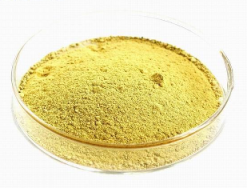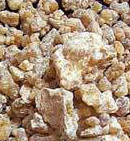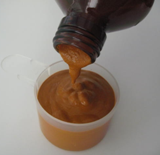 BosZym contains an “adaptogenic” mixture of fermented herbal compounds including turmerine, curcumin and boswellic acid in a synergistic proprietary formula designed for the treatment of autoimmune diseases. One of the special components of turmeric that is the antioxidant wonder is curcumin, which scientists refer to as curcuminoids. Curduminoids may prevent oxidation of blood fats better than synthetic antioxidant BHT based on test tube studies. Turmeric also contains a peptide called turmerine, a free-radical scavenger. And in studies where animals were fed curcuminoids, they found higher blood levels of glutathione-S-transferase, a key player in the body’s detoxification system.
BosZym contains an “adaptogenic” mixture of fermented herbal compounds including turmerine, curcumin and boswellic acid in a synergistic proprietary formula designed for the treatment of autoimmune diseases. One of the special components of turmeric that is the antioxidant wonder is curcumin, which scientists refer to as curcuminoids. Curduminoids may prevent oxidation of blood fats better than synthetic antioxidant BHT based on test tube studies. Turmeric also contains a peptide called turmerine, a free-radical scavenger. And in studies where animals were fed curcuminoids, they found higher blood levels of glutathione-S-transferase, a key player in the body’s detoxification system.
Turmeric contains more than two dozen anti-inflammatory compounds, including six different COX-2-inhibitors (the COX-2 enzyme promotes pain, swelling and inflammation; inhibitors selectively block that enzyme). By itself, curcumin – the component in turmeric most often cited for its healthful effects – is a multifaceted anti-inflammatory agent, and studies of the efficacy of curcumin have demonstrated positive changes in arthritic symptoms. Autoimmune diseases are characterized by the body’s immune responses being directed against its own tissues, causing prolonged inflammation and subsequent tissue destruction. Autoimmune disorders can cause immune-responsive cells to attack the linings of the joints–resulting in rheumatoid arthritis–or trigger immune cells to attack the insulin-producing islet cells of the pancreas leading to insulin-dependent Type 1 diabetes.
A healthy immune system recognizes, identifies, remembers, attacks, and destroys bacteria, viruses, fungi, parasites, and cancer cells or any health-damaging agents not normally present in the body. A defective immune system, on the other hand, wreaks havoc throughout the host by directing antibodies against its own tissues. Any disease in which cytotoxic cells are directed against self-antigens in the body’s tissues is considered autoimmune in nature. Such diseases include, but are not limited to, celiac disease, Crohn’s disease, ulcerative colitis, pancreatitis, systemic lupus erythematosus, Sjogren’s syndrome, Hashimoto’s thyroiditis, and other endocrinopathies. Allergies and multiple sclerosis are also the result of disordered immune functioning.
How are we going to desensitize immune system against the cell proteins being attacked?
First, we want to generally cut down on inflammation.
Second, we want to shift the immune response from a cell mediated Th1 dominant to a Th2 dominant response. If the cell mediated immune system (Th1) becomes “overactive” it can attack normal tissues.
Third, we want to induce tolerance to the proteins, antigens that are being attacked by the Th1 lymphocytes. This is called immunological tolerance and it a process by which the immune response learns to ignore certain molecules. In short, it tolerates their presence and does not attack them.
Fourth, we want to activate adult stem cells to regenerate destroyed cells.
 Everything we are doing is to knock down the immune attack on the body’s tissues. When that occurs, we will attempt to desensitize immune system against the cell proteins being attacked. This is called tolerance and it is definitely something that can be induced. Inflammation is a complex process involving a series of actions and/or reactions and a broad range of biologically active substances (e.g. bradykinins, histamines, prostaglandins, thromboxanes, hydroxy-fatty acids, leukotrienes, lysosomal enzymes, and lymphokines) triggered by the body’s immunological response to tissue damage. Leukotrienes, important mediators in inflammatory and allergic processes, are produced from arachidonic acid, an essential fatty acid synthesized in the body, via the key enzyme 5-lipoxygenase (5-LOX). Earlier work identified the boswellic acids, as specific, nonredox inhibitors of 5-LOX. Thus, they inhibit the production of inflammatory leukotrienes. Based on IC50 (effective inhibitory concentration of tested substance) values, acetyl-11-keto-b-boswellic acid (IV) alone provided the most potent inhibitory action due to its optimal structure.
Everything we are doing is to knock down the immune attack on the body’s tissues. When that occurs, we will attempt to desensitize immune system against the cell proteins being attacked. This is called tolerance and it is definitely something that can be induced. Inflammation is a complex process involving a series of actions and/or reactions and a broad range of biologically active substances (e.g. bradykinins, histamines, prostaglandins, thromboxanes, hydroxy-fatty acids, leukotrienes, lysosomal enzymes, and lymphokines) triggered by the body’s immunological response to tissue damage. Leukotrienes, important mediators in inflammatory and allergic processes, are produced from arachidonic acid, an essential fatty acid synthesized in the body, via the key enzyme 5-lipoxygenase (5-LOX). Earlier work identified the boswellic acids, as specific, nonredox inhibitors of 5-LOX. Thus, they inhibit the production of inflammatory leukotrienes. Based on IC50 (effective inhibitory concentration of tested substance) values, acetyl-11-keto-b-boswellic acid (IV) alone provided the most potent inhibitory action due to its optimal structure.
It has been suggested that the boswellic acids inhibit 5-LOX by one of two ways:
• Directly interacting with 5-LOX or
• interacting with the five-lipoxygenase-activating protein (FLAP).
Current research provides additional information to clarify the mechanism by which boswellic acids inhibit 5-LOX and reveals that these compounds are unique in their inhibition of 5-LOX as well as another proinflammatory enzyme, human leukocyte elastase (HLE). Boswellic acids have been found to inhibit 5-lipoxygenase, as well as, human leukocyte elastase (HLE), the serine protease produced and released by polymorphonuclear leukocytes (PMNLs) which has been suggested to play a role in several diseases (pulmonary emphysema, cystic fibrosis, chronic bronchitis, acute respiratory distress syndrome, glomerulonephritis, and rheumatic arthritis) due to its aggressive and destructive properties. This dual inhibitory action of two pathophysiologically important enzyme activities (HLE and 5-LOX) is unique to the pentacyclic triterpenes from the boswellic acid series. Several leukotriene biosynthesis inhibitors furnished no HLE inhibitory activity. b-Boswellic acid, AKBA, ursolic acid, and amyrin significantly inhibited HLE. The HLE inhibition activity of AKBA and ursolic acid were comparable, however; ursolic acid’s mode of inhibition is competitive.
 Unfortunately dietary turmerine, curcumine and boswellic acids are characterized by poor solubility and bioavailability. There are several pharmacokinetic studies about extreamly low solubility and bioavailability of these compounds, which means that most of what we swallow goes directly into our gastrointestinal area and is expelled. In order to introduce pure turmerine, curcumine and boswellic acids into the blood via absorption and maximize the activity of these compounds in the body, you could use BosZym. BosZym is the only product in the world that has perfect solubility and bioavailability of these compounds enough to modulate autoimmune responses. Otherwise, these compounds wouldn’t have worked. BosZym is synergistic with ButturZym, TeanZym, HydranZym and GinolZym.
Unfortunately dietary turmerine, curcumine and boswellic acids are characterized by poor solubility and bioavailability. There are several pharmacokinetic studies about extreamly low solubility and bioavailability of these compounds, which means that most of what we swallow goes directly into our gastrointestinal area and is expelled. In order to introduce pure turmerine, curcumine and boswellic acids into the blood via absorption and maximize the activity of these compounds in the body, you could use BosZym. BosZym is the only product in the world that has perfect solubility and bioavailability of these compounds enough to modulate autoimmune responses. Otherwise, these compounds wouldn’t have worked. BosZym is synergistic with ButturZym, TeanZym, HydranZym and GinolZym.